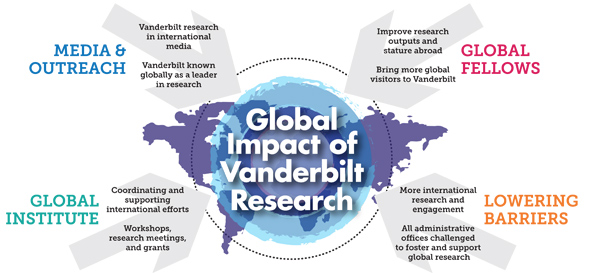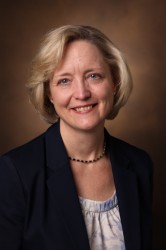
A new university-wide International Strategy Report was released today, the result of a yearlong effort by the faculty-led International Strategy Working Group. To strengthen Vanderbilt’s international research, scholarship and creative expression efforts and to raise the global profile of the university as a research institution, the report recommends a four-point strategy to build on Vanderbilt’s strengths while supporting the university’s Academic Strategic Plan and its commitment to equity, diversity and inclusion.

“Over the past year, the International Strategy Working Group’s 13 members have engaged faculty from across the university to harness their energies, insights and ideas on how to expand Vanderbilt’s global reach. Their dedicated work has produced a proposed roadmap for solidifying the university’s international presence, which is critical to our success as a leading research institution,” Provost and Vice Chancellor for Academic Affairs Susan R. Wente said. “It is vitally important, now more than ever, that we share Vanderbilt’s work and discoveries with the world and show the tremendous value of education and research for all of society.”
“Embodying the One Vanderbilt approach, the interconnected set of initiatives we propose are designed to make a singular impact across the entire university by supporting research, graduate education and public engagement while simultaneously advancing Vanderbilt’s global reputation,” said ISWG co-chairs Ted Fischer, Cornelius Vanderbilt Professor of Anthropology and director of the Center for Latin American Studies, and Ingrid Wuerth, Helen Strong Curry Professor of International Law and director of the International Legal Studies Program at Vanderbilt Law School.
Each of the report’s four strategic points has specific and broad support in feedback from faculty and administrators. The ISWG’s research also shows that each is consistent with best practices at peer institutions. “Implemented together and adequately funded with new resources, the elements of this strategy can propel Vanderbilt’s international engagement and bring the global recognition our great university merits,” the ISWG said in its report.
- First: Create an institute specifically tasked with spearheading international efforts (i.e., a “Global Institute,” “Institute for Global Research and Engagement” or similar).
- Second: Develop and implement a comprehensive, university-wide international media and outreach strategy.
- Third: Adapt administrative structures to better support and foster international research across the university.
- Fourth: Create a “Global Fellows” (or similarly titled) program to bring more international visitors and graduate students to campus.
The ISWG was appointed by Wente in September 2016 and gathered input from faculty and administrators in each of Vanderbilt’s colleges and schools over the 2016-17 academic year. Wente identified four guiding principles for the working group in executing its charge: the strategy should build on a grassroots foundation; it should support One Vanderbilt trans-institutional approaches; it should enhance scholarship through strategic and aligned investment; and it should identify ways to better communicate Vanderbilt research to a global audience.
“I’m excited to see that the report’s recommendations align with a number of efforts already underway across campus, from the planning for investments in graduate education and research to recent administrative changes in our Office of Sponsored Programs Administration,” Wente said. “I look forward to working with the schools and colleges as we continue to move the university forward in this important area.”
“After considering a wide range of models, we are convinced that implementing these four strategic initiatives in lockstep is the best, most resource-effective way to enhance Vanderbilt’s international research and its global profile,” the working group said. “They will enrich our intellectual community by better integrating a globally diverse set of ideas, creative practices and research methodologies in the work that we do. They will enrich our work in the humanities and arts. Together they will enhance our ability to address substantial global problems—whether social, political, economic, medical or technological—by providing our faculty with more of the tools necessary to do internationally relevant work and by helping ensure that the new knowledge generated is accessible to a global audience.”
Read the 2017 International Strategy Report >>
Learn more about the Academic Strategic Plan’s international strategy initiative.